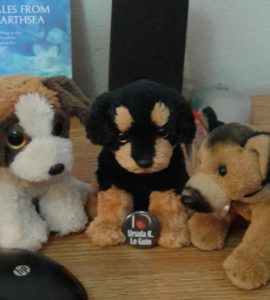The first time I saw Ursula K. Le Guin give a reading, I was surprised that she was a more petite woman than I’d imagined, and touched to discover that her small frame and way of moving reminded me quite a bit of my mother. It always seemed to me that my mother’s fine-boned structure, combined with a special poise and elegance, contributed to giving her a fey quality. Before seeing Le Guin in person that day, I’d only seen a few black and white photos of her face. It wasn’t that I expected her to be a particularly tall or robust woman, but I certainly hadn’t anticipated that she would share that elven quality my mother had. Upon reflection, it seemed highly appropriate for someone capable of such powerful magic with words.
One descriptor that’s appeared often in the many articles written about Le Guin this week is ‘giant’, with her being referred to as ‘a literary giant’ or a ‘giant of science fiction’. Thinking about this led to a realization I wrote about in an email to a dear writer friend and fellow Le Guin fan, and I wanted to share part of it here:
Some people with brilliant minds and a powerful presence — full of a great, sparkling mental energy — just seem like they should be immortal, and a world without her in it feels like a world left with a huge empty space. It dawned on me yesterday that when someone who appears — on the outside — in the form of a small elderly woman can leave behind such a gigantic hole, it’s exactly what Jem thinks about his foster mother, Enkara, near the beginning of White Sky: ” . . . Enkara, who was one of the oldest of the midwives, was also one of the smallest women in that house, and she didn’t look strong. But Jem knew that in truth she was larger than the others. On the inside, where it really counted, she was bigger than all the rest of them put together.”

